Sociology Report: Comparative Study of UK and Indian Education Systems
VerifiedAdded on 2023/04/20
|10
|2825
|225
Report
AI Summary
This report provides a comparative analysis of the UK and Indian education systems, focusing on their respective advantages and disadvantages for international students. It highlights the UK's strengths, such as world-class facilities, research opportunities, and shorter degree programs, while also acknowledging its high costs and potential lack of cultural diversity in some institutions. The report contrasts this with the Indian system, noting its developing infrastructure and theoretical knowledge base, while also pointing out its deficiencies in world-class universities, research focus, and funding. The report offers recommendations for improving the Indian education system, including promoting research-oriented studies, creating a more international-friendly environment, increasing government funding, and implementing policy changes to attract international students. The report also discusses the practical steps needed to implement these changes, such as increasing infrastructure investment, and improving primary education to foster innovation. The report concludes with a call for political will and public-private partnerships to elevate Indian universities to global standards.

SOCIOLOGY
Paraphrase This Document
Need a fresh take? Get an instant paraphrase of this document with our AI Paraphraser

1
Contents
INTRODUCTION.................................................................................................................................1
Advantages and disadvantages of UK educational system....................................................................1
Comparison with educational system in India.......................................................................................3
Recommendation to changes.................................................................................................................4
Why and how changes can be implemented..........................................................................................5
Conclusion.............................................................................................................................................6
REFERENCES......................................................................................................................................6
Contents
INTRODUCTION.................................................................................................................................1
Advantages and disadvantages of UK educational system....................................................................1
Comparison with educational system in India.......................................................................................3
Recommendation to changes.................................................................................................................4
Why and how changes can be implemented..........................................................................................5
Conclusion.............................................................................................................................................6
REFERENCES......................................................................................................................................6
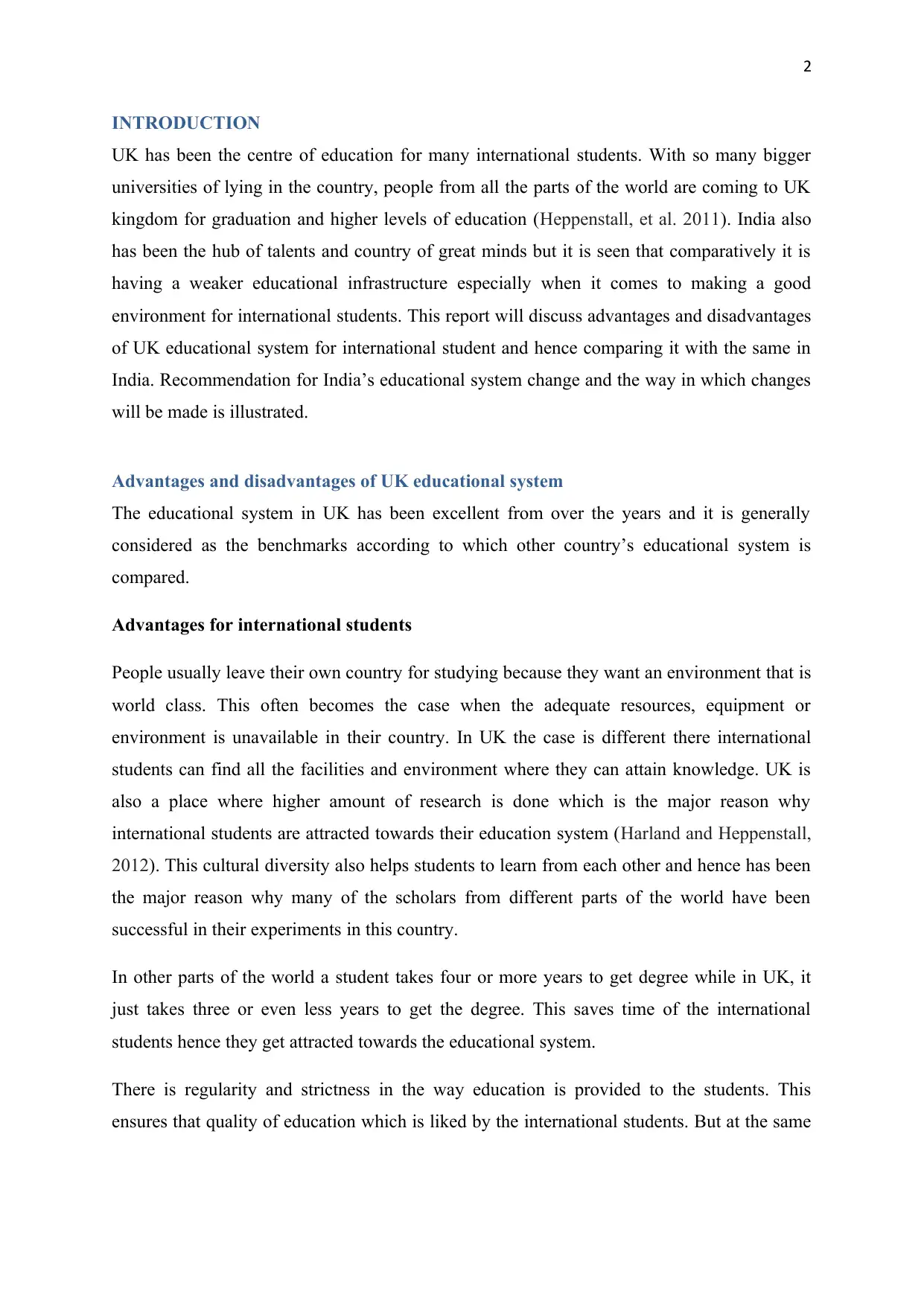
2
INTRODUCTION
UK has been the centre of education for many international students. With so many bigger
universities of lying in the country, people from all the parts of the world are coming to UK
kingdom for graduation and higher levels of education (Heppenstall, et al. 2011). India also
has been the hub of talents and country of great minds but it is seen that comparatively it is
having a weaker educational infrastructure especially when it comes to making a good
environment for international students. This report will discuss advantages and disadvantages
of UK educational system for international student and hence comparing it with the same in
India. Recommendation for India’s educational system change and the way in which changes
will be made is illustrated.
Advantages and disadvantages of UK educational system
The educational system in UK has been excellent from over the years and it is generally
considered as the benchmarks according to which other country’s educational system is
compared.
Advantages for international students
People usually leave their own country for studying because they want an environment that is
world class. This often becomes the case when the adequate resources, equipment or
environment is unavailable in their country. In UK the case is different there international
students can find all the facilities and environment where they can attain knowledge. UK is
also a place where higher amount of research is done which is the major reason why
international students are attracted towards their education system (Harland and Heppenstall,
2012). This cultural diversity also helps students to learn from each other and hence has been
the major reason why many of the scholars from different parts of the world have been
successful in their experiments in this country.
In other parts of the world a student takes four or more years to get degree while in UK, it
just takes three or even less years to get the degree. This saves time of the international
students hence they get attracted towards the educational system.
There is regularity and strictness in the way education is provided to the students. This
ensures that quality of education which is liked by the international students. But at the same
INTRODUCTION
UK has been the centre of education for many international students. With so many bigger
universities of lying in the country, people from all the parts of the world are coming to UK
kingdom for graduation and higher levels of education (Heppenstall, et al. 2011). India also
has been the hub of talents and country of great minds but it is seen that comparatively it is
having a weaker educational infrastructure especially when it comes to making a good
environment for international students. This report will discuss advantages and disadvantages
of UK educational system for international student and hence comparing it with the same in
India. Recommendation for India’s educational system change and the way in which changes
will be made is illustrated.
Advantages and disadvantages of UK educational system
The educational system in UK has been excellent from over the years and it is generally
considered as the benchmarks according to which other country’s educational system is
compared.
Advantages for international students
People usually leave their own country for studying because they want an environment that is
world class. This often becomes the case when the adequate resources, equipment or
environment is unavailable in their country. In UK the case is different there international
students can find all the facilities and environment where they can attain knowledge. UK is
also a place where higher amount of research is done which is the major reason why
international students are attracted towards their education system (Harland and Heppenstall,
2012). This cultural diversity also helps students to learn from each other and hence has been
the major reason why many of the scholars from different parts of the world have been
successful in their experiments in this country.
In other parts of the world a student takes four or more years to get degree while in UK, it
just takes three or even less years to get the degree. This saves time of the international
students hence they get attracted towards the educational system.
There is regularity and strictness in the way education is provided to the students. This
ensures that quality of education which is liked by the international students. But at the same
⊘ This is a preview!⊘
Do you want full access?
Subscribe today to unlock all pages.

Trusted by 1+ million students worldwide
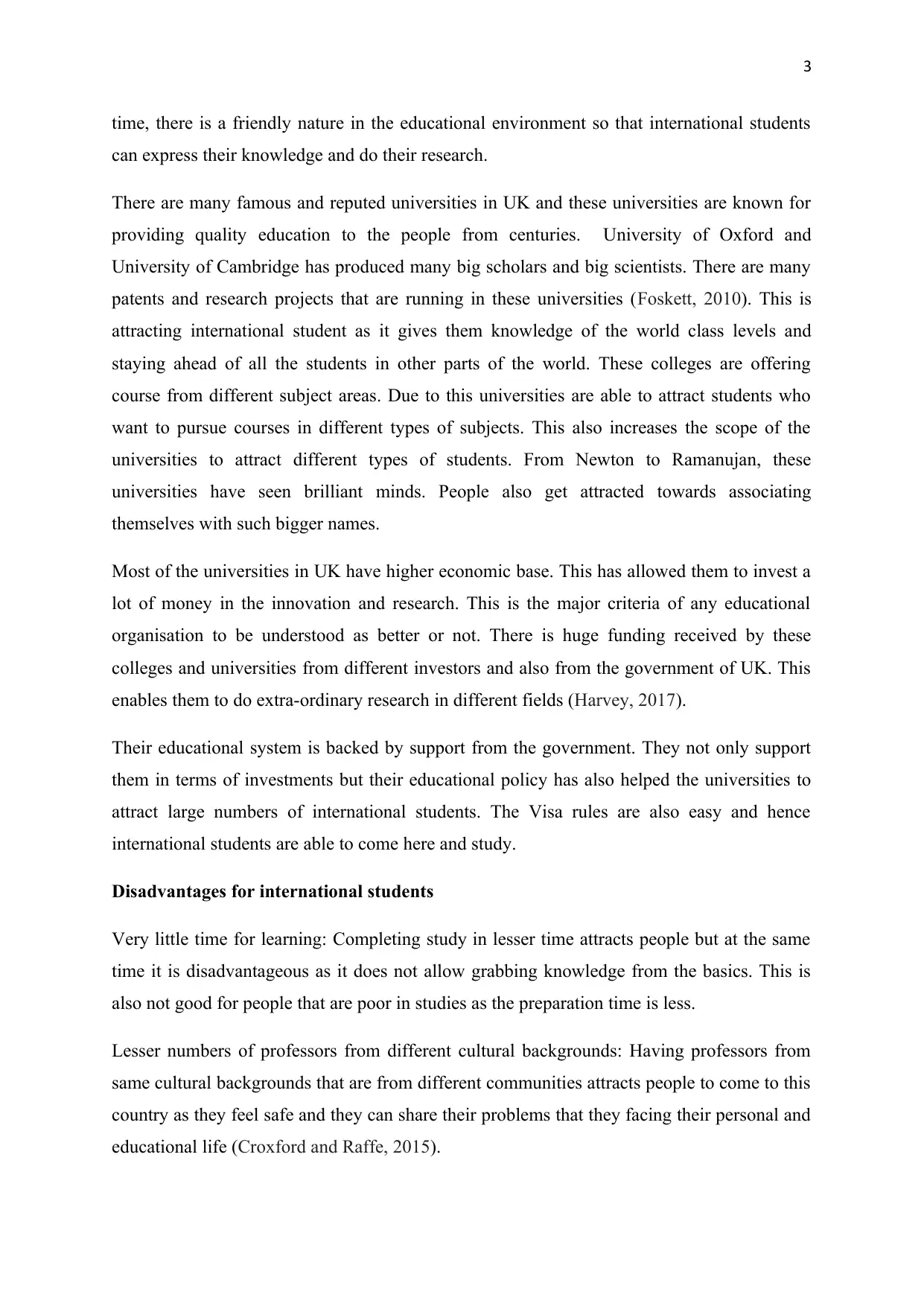
3
time, there is a friendly nature in the educational environment so that international students
can express their knowledge and do their research.
There are many famous and reputed universities in UK and these universities are known for
providing quality education to the people from centuries. University of Oxford and
University of Cambridge has produced many big scholars and big scientists. There are many
patents and research projects that are running in these universities (Foskett, 2010). This is
attracting international student as it gives them knowledge of the world class levels and
staying ahead of all the students in other parts of the world. These colleges are offering
course from different subject areas. Due to this universities are able to attract students who
want to pursue courses in different types of subjects. This also increases the scope of the
universities to attract different types of students. From Newton to Ramanujan, these
universities have seen brilliant minds. People also get attracted towards associating
themselves with such bigger names.
Most of the universities in UK have higher economic base. This has allowed them to invest a
lot of money in the innovation and research. This is the major criteria of any educational
organisation to be understood as better or not. There is huge funding received by these
colleges and universities from different investors and also from the government of UK. This
enables them to do extra-ordinary research in different fields (Harvey, 2017).
Their educational system is backed by support from the government. They not only support
them in terms of investments but their educational policy has also helped the universities to
attract large numbers of international students. The Visa rules are also easy and hence
international students are able to come here and study.
Disadvantages for international students
Very little time for learning: Completing study in lesser time attracts people but at the same
time it is disadvantageous as it does not allow grabbing knowledge from the basics. This is
also not good for people that are poor in studies as the preparation time is less.
Lesser numbers of professors from different cultural backgrounds: Having professors from
same cultural backgrounds that are from different communities attracts people to come to this
country as they feel safe and they can share their problems that they facing their personal and
educational life (Croxford and Raffe, 2015).
time, there is a friendly nature in the educational environment so that international students
can express their knowledge and do their research.
There are many famous and reputed universities in UK and these universities are known for
providing quality education to the people from centuries. University of Oxford and
University of Cambridge has produced many big scholars and big scientists. There are many
patents and research projects that are running in these universities (Foskett, 2010). This is
attracting international student as it gives them knowledge of the world class levels and
staying ahead of all the students in other parts of the world. These colleges are offering
course from different subject areas. Due to this universities are able to attract students who
want to pursue courses in different types of subjects. This also increases the scope of the
universities to attract different types of students. From Newton to Ramanujan, these
universities have seen brilliant minds. People also get attracted towards associating
themselves with such bigger names.
Most of the universities in UK have higher economic base. This has allowed them to invest a
lot of money in the innovation and research. This is the major criteria of any educational
organisation to be understood as better or not. There is huge funding received by these
colleges and universities from different investors and also from the government of UK. This
enables them to do extra-ordinary research in different fields (Harvey, 2017).
Their educational system is backed by support from the government. They not only support
them in terms of investments but their educational policy has also helped the universities to
attract large numbers of international students. The Visa rules are also easy and hence
international students are able to come here and study.
Disadvantages for international students
Very little time for learning: Completing study in lesser time attracts people but at the same
time it is disadvantageous as it does not allow grabbing knowledge from the basics. This is
also not good for people that are poor in studies as the preparation time is less.
Lesser numbers of professors from different cultural backgrounds: Having professors from
same cultural backgrounds that are from different communities attracts people to come to this
country as they feel safe and they can share their problems that they facing their personal and
educational life (Croxford and Raffe, 2015).
Paraphrase This Document
Need a fresh take? Get an instant paraphrase of this document with our AI Paraphraser
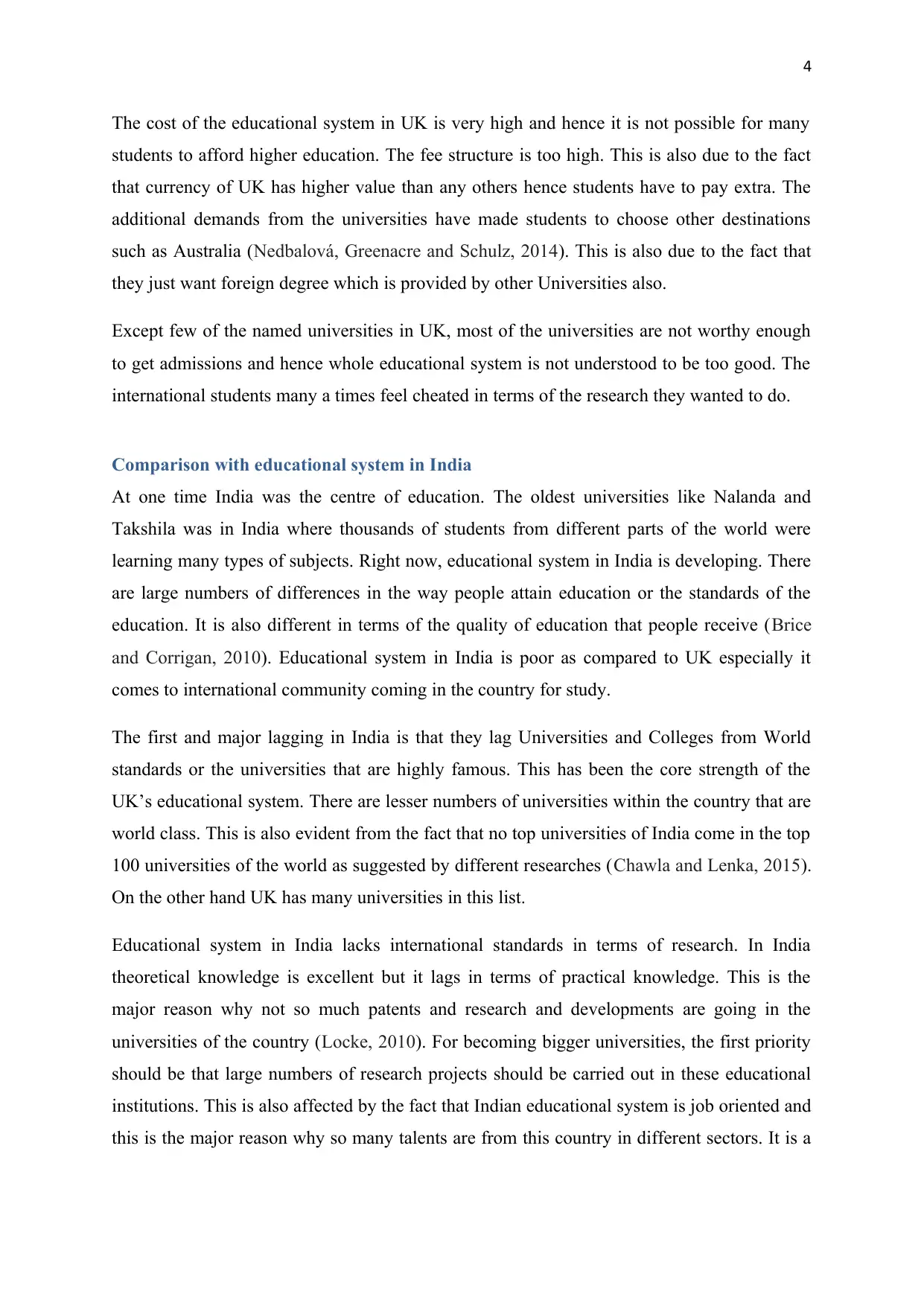
4
The cost of the educational system in UK is very high and hence it is not possible for many
students to afford higher education. The fee structure is too high. This is also due to the fact
that currency of UK has higher value than any others hence students have to pay extra. The
additional demands from the universities have made students to choose other destinations
such as Australia (Nedbalová, Greenacre and Schulz, 2014). This is also due to the fact that
they just want foreign degree which is provided by other Universities also.
Except few of the named universities in UK, most of the universities are not worthy enough
to get admissions and hence whole educational system is not understood to be too good. The
international students many a times feel cheated in terms of the research they wanted to do.
Comparison with educational system in India
At one time India was the centre of education. The oldest universities like Nalanda and
Takshila was in India where thousands of students from different parts of the world were
learning many types of subjects. Right now, educational system in India is developing. There
are large numbers of differences in the way people attain education or the standards of the
education. It is also different in terms of the quality of education that people receive (Brice
and Corrigan, 2010). Educational system in India is poor as compared to UK especially it
comes to international community coming in the country for study.
The first and major lagging in India is that they lag Universities and Colleges from World
standards or the universities that are highly famous. This has been the core strength of the
UK’s educational system. There are lesser numbers of universities within the country that are
world class. This is also evident from the fact that no top universities of India come in the top
100 universities of the world as suggested by different researches (Chawla and Lenka, 2015).
On the other hand UK has many universities in this list.
Educational system in India lacks international standards in terms of research. In India
theoretical knowledge is excellent but it lags in terms of practical knowledge. This is the
major reason why not so much patents and research and developments are going in the
universities of the country (Locke, 2010). For becoming bigger universities, the first priority
should be that large numbers of research projects should be carried out in these educational
institutions. This is also affected by the fact that Indian educational system is job oriented and
this is the major reason why so many talents are from this country in different sectors. It is a
The cost of the educational system in UK is very high and hence it is not possible for many
students to afford higher education. The fee structure is too high. This is also due to the fact
that currency of UK has higher value than any others hence students have to pay extra. The
additional demands from the universities have made students to choose other destinations
such as Australia (Nedbalová, Greenacre and Schulz, 2014). This is also due to the fact that
they just want foreign degree which is provided by other Universities also.
Except few of the named universities in UK, most of the universities are not worthy enough
to get admissions and hence whole educational system is not understood to be too good. The
international students many a times feel cheated in terms of the research they wanted to do.
Comparison with educational system in India
At one time India was the centre of education. The oldest universities like Nalanda and
Takshila was in India where thousands of students from different parts of the world were
learning many types of subjects. Right now, educational system in India is developing. There
are large numbers of differences in the way people attain education or the standards of the
education. It is also different in terms of the quality of education that people receive (Brice
and Corrigan, 2010). Educational system in India is poor as compared to UK especially it
comes to international community coming in the country for study.
The first and major lagging in India is that they lag Universities and Colleges from World
standards or the universities that are highly famous. This has been the core strength of the
UK’s educational system. There are lesser numbers of universities within the country that are
world class. This is also evident from the fact that no top universities of India come in the top
100 universities of the world as suggested by different researches (Chawla and Lenka, 2015).
On the other hand UK has many universities in this list.
Educational system in India lacks international standards in terms of research. In India
theoretical knowledge is excellent but it lags in terms of practical knowledge. This is the
major reason why not so much patents and research and developments are going in the
universities of the country (Locke, 2010). For becoming bigger universities, the first priority
should be that large numbers of research projects should be carried out in these educational
institutions. This is also affected by the fact that Indian educational system is job oriented and
this is the major reason why so many talents are from this country in different sectors. It is a
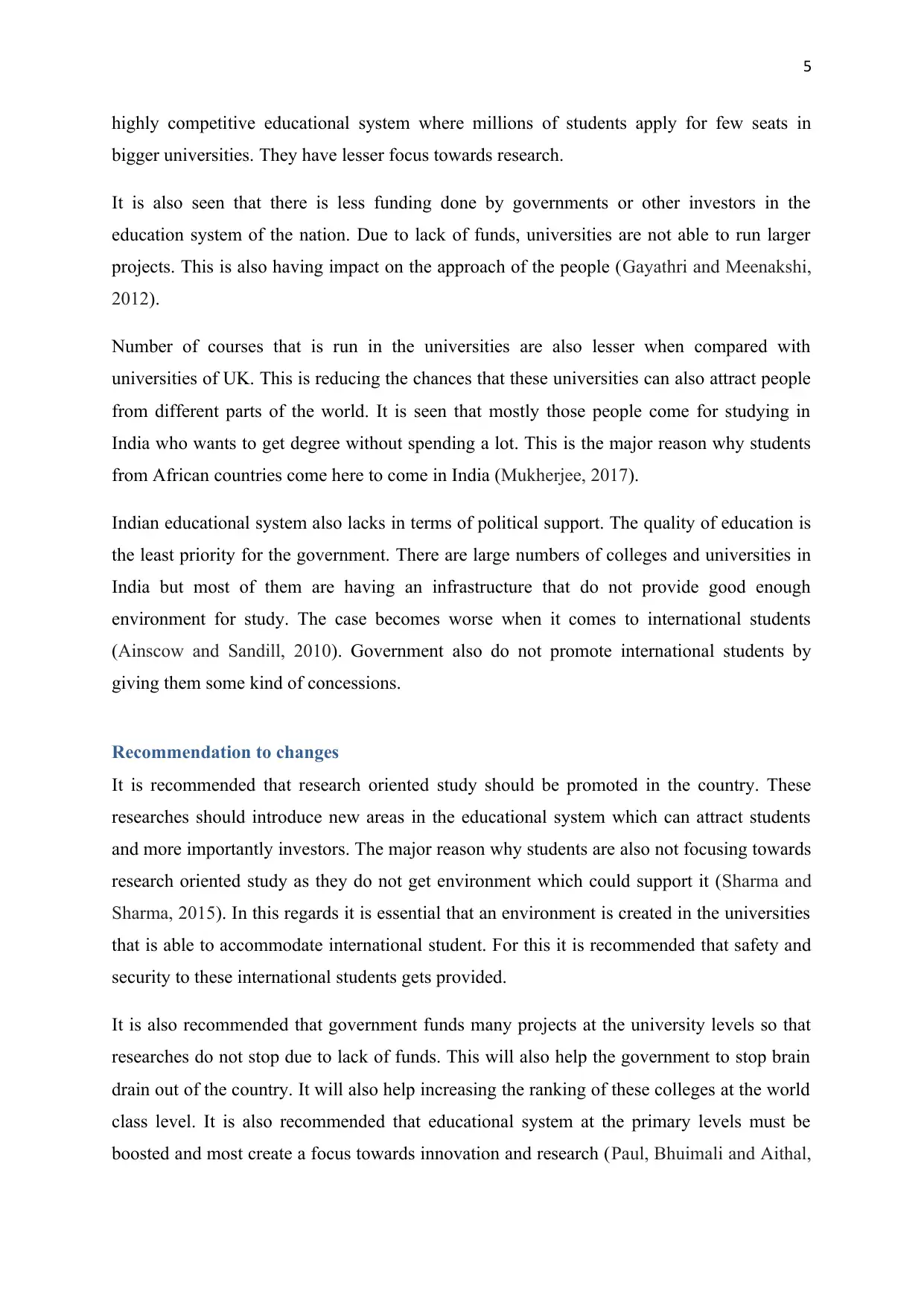
5
highly competitive educational system where millions of students apply for few seats in
bigger universities. They have lesser focus towards research.
It is also seen that there is less funding done by governments or other investors in the
education system of the nation. Due to lack of funds, universities are not able to run larger
projects. This is also having impact on the approach of the people (Gayathri and Meenakshi,
2012).
Number of courses that is run in the universities are also lesser when compared with
universities of UK. This is reducing the chances that these universities can also attract people
from different parts of the world. It is seen that mostly those people come for studying in
India who wants to get degree without spending a lot. This is the major reason why students
from African countries come here to come in India (Mukherjee, 2017).
Indian educational system also lacks in terms of political support. The quality of education is
the least priority for the government. There are large numbers of colleges and universities in
India but most of them are having an infrastructure that do not provide good enough
environment for study. The case becomes worse when it comes to international students
(Ainscow and Sandill, 2010). Government also do not promote international students by
giving them some kind of concessions.
Recommendation to changes
It is recommended that research oriented study should be promoted in the country. These
researches should introduce new areas in the educational system which can attract students
and more importantly investors. The major reason why students are also not focusing towards
research oriented study as they do not get environment which could support it (Sharma and
Sharma, 2015). In this regards it is essential that an environment is created in the universities
that is able to accommodate international student. For this it is recommended that safety and
security to these international students gets provided.
It is also recommended that government funds many projects at the university levels so that
researches do not stop due to lack of funds. This will also help the government to stop brain
drain out of the country. It will also help increasing the ranking of these colleges at the world
class level. It is also recommended that educational system at the primary levels must be
boosted and most create a focus towards innovation and research (Paul, Bhuimali and Aithal,
highly competitive educational system where millions of students apply for few seats in
bigger universities. They have lesser focus towards research.
It is also seen that there is less funding done by governments or other investors in the
education system of the nation. Due to lack of funds, universities are not able to run larger
projects. This is also having impact on the approach of the people (Gayathri and Meenakshi,
2012).
Number of courses that is run in the universities are also lesser when compared with
universities of UK. This is reducing the chances that these universities can also attract people
from different parts of the world. It is seen that mostly those people come for studying in
India who wants to get degree without spending a lot. This is the major reason why students
from African countries come here to come in India (Mukherjee, 2017).
Indian educational system also lacks in terms of political support. The quality of education is
the least priority for the government. There are large numbers of colleges and universities in
India but most of them are having an infrastructure that do not provide good enough
environment for study. The case becomes worse when it comes to international students
(Ainscow and Sandill, 2010). Government also do not promote international students by
giving them some kind of concessions.
Recommendation to changes
It is recommended that research oriented study should be promoted in the country. These
researches should introduce new areas in the educational system which can attract students
and more importantly investors. The major reason why students are also not focusing towards
research oriented study as they do not get environment which could support it (Sharma and
Sharma, 2015). In this regards it is essential that an environment is created in the universities
that is able to accommodate international student. For this it is recommended that safety and
security to these international students gets provided.
It is also recommended that government funds many projects at the university levels so that
researches do not stop due to lack of funds. This will also help the government to stop brain
drain out of the country. It will also help increasing the ranking of these colleges at the world
class level. It is also recommended that educational system at the primary levels must be
boosted and most create a focus towards innovation and research (Paul, Bhuimali and Aithal,
⊘ This is a preview!⊘
Do you want full access?
Subscribe today to unlock all pages.

Trusted by 1+ million students worldwide
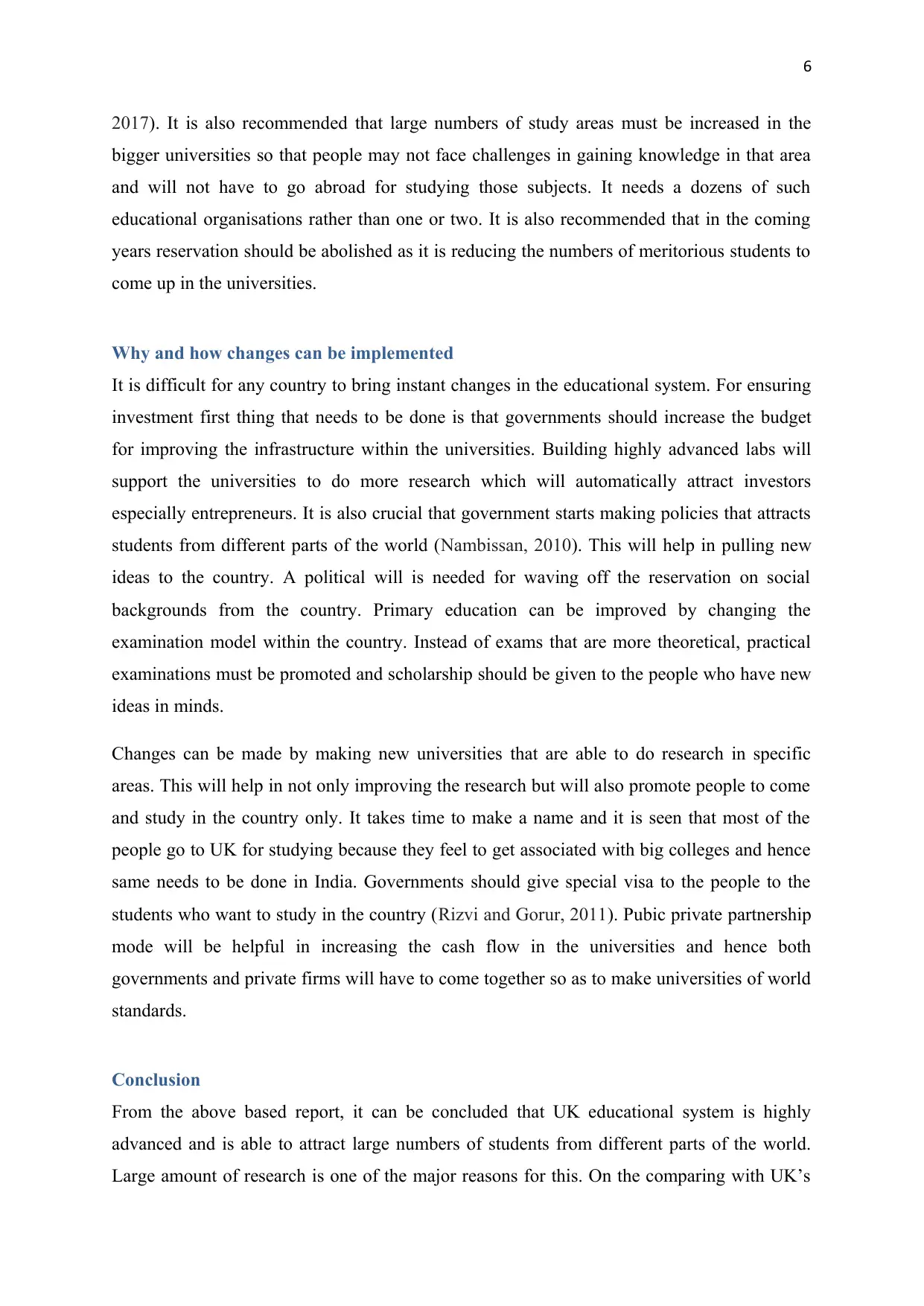
6
2017). It is also recommended that large numbers of study areas must be increased in the
bigger universities so that people may not face challenges in gaining knowledge in that area
and will not have to go abroad for studying those subjects. It needs a dozens of such
educational organisations rather than one or two. It is also recommended that in the coming
years reservation should be abolished as it is reducing the numbers of meritorious students to
come up in the universities.
Why and how changes can be implemented
It is difficult for any country to bring instant changes in the educational system. For ensuring
investment first thing that needs to be done is that governments should increase the budget
for improving the infrastructure within the universities. Building highly advanced labs will
support the universities to do more research which will automatically attract investors
especially entrepreneurs. It is also crucial that government starts making policies that attracts
students from different parts of the world (Nambissan, 2010). This will help in pulling new
ideas to the country. A political will is needed for waving off the reservation on social
backgrounds from the country. Primary education can be improved by changing the
examination model within the country. Instead of exams that are more theoretical, practical
examinations must be promoted and scholarship should be given to the people who have new
ideas in minds.
Changes can be made by making new universities that are able to do research in specific
areas. This will help in not only improving the research but will also promote people to come
and study in the country only. It takes time to make a name and it is seen that most of the
people go to UK for studying because they feel to get associated with big colleges and hence
same needs to be done in India. Governments should give special visa to the people to the
students who want to study in the country (Rizvi and Gorur, 2011). Pubic private partnership
mode will be helpful in increasing the cash flow in the universities and hence both
governments and private firms will have to come together so as to make universities of world
standards.
Conclusion
From the above based report, it can be concluded that UK educational system is highly
advanced and is able to attract large numbers of students from different parts of the world.
Large amount of research is one of the major reasons for this. On the comparing with UK’s
2017). It is also recommended that large numbers of study areas must be increased in the
bigger universities so that people may not face challenges in gaining knowledge in that area
and will not have to go abroad for studying those subjects. It needs a dozens of such
educational organisations rather than one or two. It is also recommended that in the coming
years reservation should be abolished as it is reducing the numbers of meritorious students to
come up in the universities.
Why and how changes can be implemented
It is difficult for any country to bring instant changes in the educational system. For ensuring
investment first thing that needs to be done is that governments should increase the budget
for improving the infrastructure within the universities. Building highly advanced labs will
support the universities to do more research which will automatically attract investors
especially entrepreneurs. It is also crucial that government starts making policies that attracts
students from different parts of the world (Nambissan, 2010). This will help in pulling new
ideas to the country. A political will is needed for waving off the reservation on social
backgrounds from the country. Primary education can be improved by changing the
examination model within the country. Instead of exams that are more theoretical, practical
examinations must be promoted and scholarship should be given to the people who have new
ideas in minds.
Changes can be made by making new universities that are able to do research in specific
areas. This will help in not only improving the research but will also promote people to come
and study in the country only. It takes time to make a name and it is seen that most of the
people go to UK for studying because they feel to get associated with big colleges and hence
same needs to be done in India. Governments should give special visa to the people to the
students who want to study in the country (Rizvi and Gorur, 2011). Pubic private partnership
mode will be helpful in increasing the cash flow in the universities and hence both
governments and private firms will have to come together so as to make universities of world
standards.
Conclusion
From the above based report, it can be concluded that UK educational system is highly
advanced and is able to attract large numbers of students from different parts of the world.
Large amount of research is one of the major reasons for this. On the comparing with UK’s
Paraphrase This Document
Need a fresh take? Get an instant paraphrase of this document with our AI Paraphraser

7
educational system, India’s educational system is poor. More research oriented infrastructure
needs to be made in the country for this huge investment is required. This can be done
through using public private partnership.
educational system, India’s educational system is poor. More research oriented infrastructure
needs to be made in the country for this huge investment is required. This can be done
through using public private partnership.
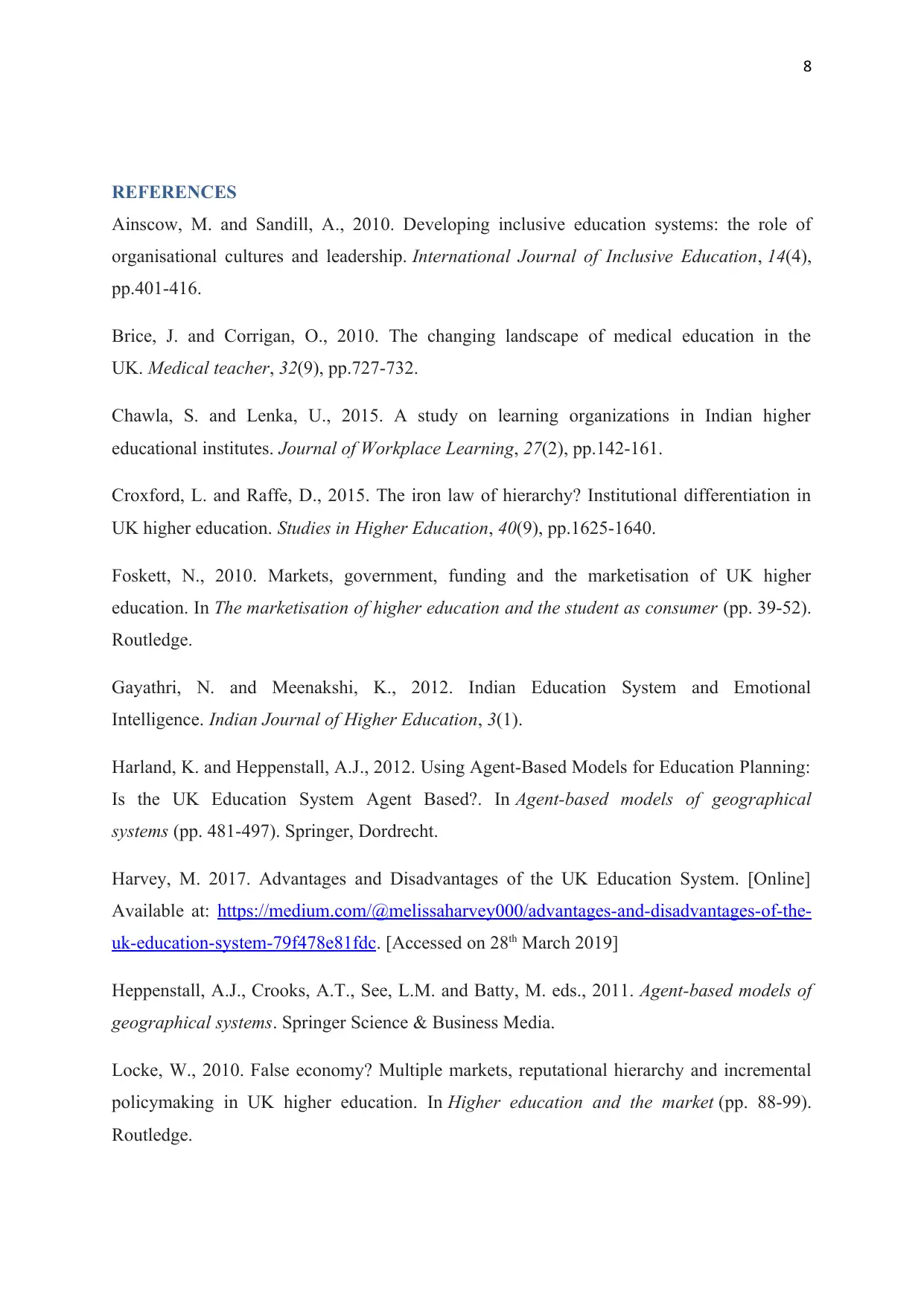
8
REFERENCES
Ainscow, M. and Sandill, A., 2010. Developing inclusive education systems: the role of
organisational cultures and leadership. International Journal of Inclusive Education, 14(4),
pp.401-416.
Brice, J. and Corrigan, O., 2010. The changing landscape of medical education in the
UK. Medical teacher, 32(9), pp.727-732.
Chawla, S. and Lenka, U., 2015. A study on learning organizations in Indian higher
educational institutes. Journal of Workplace Learning, 27(2), pp.142-161.
Croxford, L. and Raffe, D., 2015. The iron law of hierarchy? Institutional differentiation in
UK higher education. Studies in Higher Education, 40(9), pp.1625-1640.
Foskett, N., 2010. Markets, government, funding and the marketisation of UK higher
education. In The marketisation of higher education and the student as consumer (pp. 39-52).
Routledge.
Gayathri, N. and Meenakshi, K., 2012. Indian Education System and Emotional
Intelligence. Indian Journal of Higher Education, 3(1).
Harland, K. and Heppenstall, A.J., 2012. Using Agent-Based Models for Education Planning:
Is the UK Education System Agent Based?. In Agent-based models of geographical
systems (pp. 481-497). Springer, Dordrecht.
Harvey, M. 2017. Advantages and Disadvantages of the UK Education System. [Online]
Available at: https://medium.com/@melissaharvey000/advantages-and-disadvantages-of-the-
uk-education-system-79f478e81fdc. [Accessed on 28th March 2019]
Heppenstall, A.J., Crooks, A.T., See, L.M. and Batty, M. eds., 2011. Agent-based models of
geographical systems. Springer Science & Business Media.
Locke, W., 2010. False economy? Multiple markets, reputational hierarchy and incremental
policymaking in UK higher education. In Higher education and the market (pp. 88-99).
Routledge.
REFERENCES
Ainscow, M. and Sandill, A., 2010. Developing inclusive education systems: the role of
organisational cultures and leadership. International Journal of Inclusive Education, 14(4),
pp.401-416.
Brice, J. and Corrigan, O., 2010. The changing landscape of medical education in the
UK. Medical teacher, 32(9), pp.727-732.
Chawla, S. and Lenka, U., 2015. A study on learning organizations in Indian higher
educational institutes. Journal of Workplace Learning, 27(2), pp.142-161.
Croxford, L. and Raffe, D., 2015. The iron law of hierarchy? Institutional differentiation in
UK higher education. Studies in Higher Education, 40(9), pp.1625-1640.
Foskett, N., 2010. Markets, government, funding and the marketisation of UK higher
education. In The marketisation of higher education and the student as consumer (pp. 39-52).
Routledge.
Gayathri, N. and Meenakshi, K., 2012. Indian Education System and Emotional
Intelligence. Indian Journal of Higher Education, 3(1).
Harland, K. and Heppenstall, A.J., 2012. Using Agent-Based Models for Education Planning:
Is the UK Education System Agent Based?. In Agent-based models of geographical
systems (pp. 481-497). Springer, Dordrecht.
Harvey, M. 2017. Advantages and Disadvantages of the UK Education System. [Online]
Available at: https://medium.com/@melissaharvey000/advantages-and-disadvantages-of-the-
uk-education-system-79f478e81fdc. [Accessed on 28th March 2019]
Heppenstall, A.J., Crooks, A.T., See, L.M. and Batty, M. eds., 2011. Agent-based models of
geographical systems. Springer Science & Business Media.
Locke, W., 2010. False economy? Multiple markets, reputational hierarchy and incremental
policymaking in UK higher education. In Higher education and the market (pp. 88-99).
Routledge.
⊘ This is a preview!⊘
Do you want full access?
Subscribe today to unlock all pages.

Trusted by 1+ million students worldwide
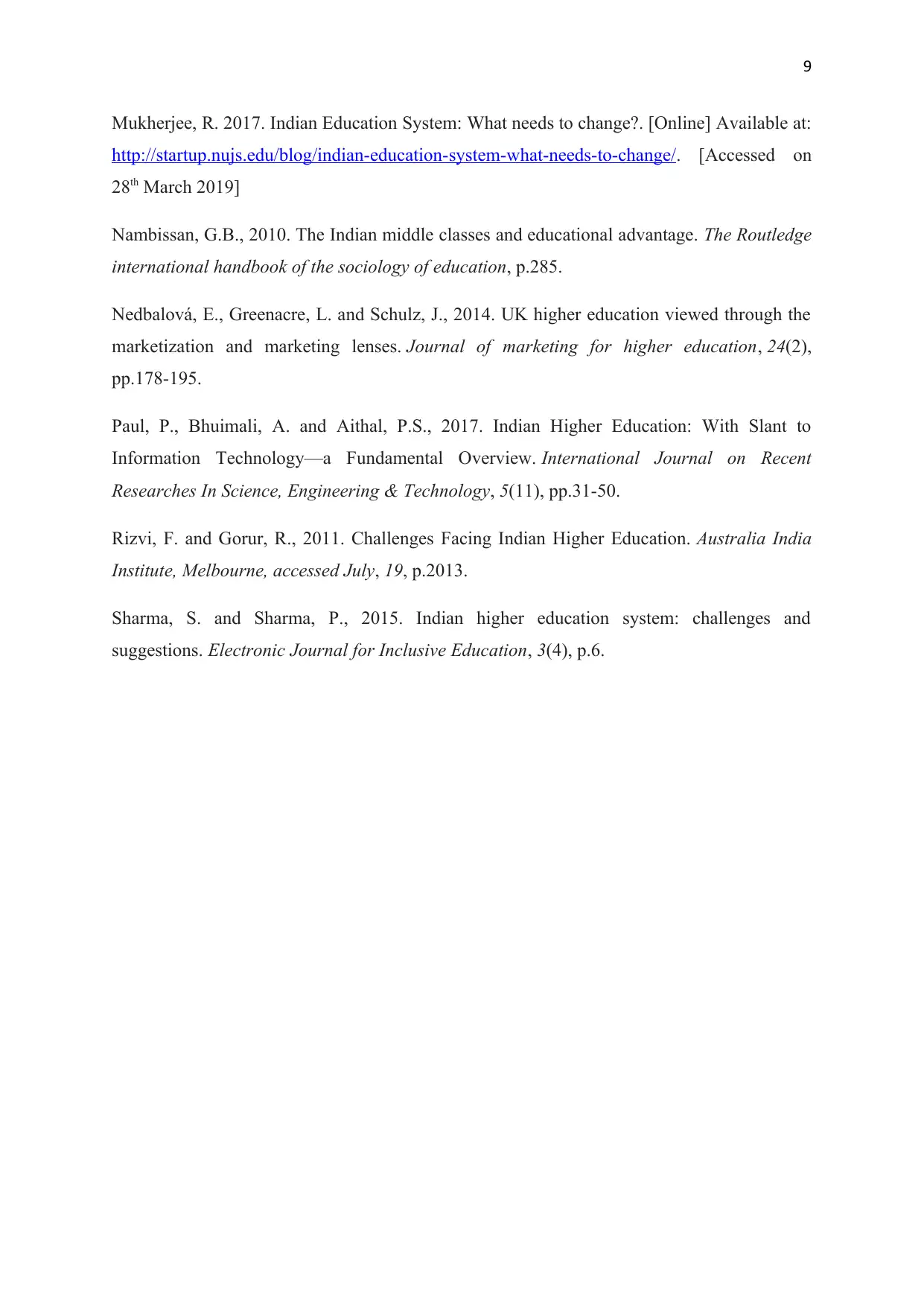
9
Mukherjee, R. 2017. Indian Education System: What needs to change?. [Online] Available at:
http://startup.nujs.edu/blog/indian-education-system-what-needs-to-change/. [Accessed on
28th March 2019]
Nambissan, G.B., 2010. The Indian middle classes and educational advantage. The Routledge
international handbook of the sociology of education, p.285.
Nedbalová, E., Greenacre, L. and Schulz, J., 2014. UK higher education viewed through the
marketization and marketing lenses. Journal of marketing for higher education, 24(2),
pp.178-195.
Paul, P., Bhuimali, A. and Aithal, P.S., 2017. Indian Higher Education: With Slant to
Information Technology—a Fundamental Overview. International Journal on Recent
Researches In Science, Engineering & Technology, 5(11), pp.31-50.
Rizvi, F. and Gorur, R., 2011. Challenges Facing Indian Higher Education. Australia India
Institute, Melbourne, accessed July, 19, p.2013.
Sharma, S. and Sharma, P., 2015. Indian higher education system: challenges and
suggestions. Electronic Journal for Inclusive Education, 3(4), p.6.
Mukherjee, R. 2017. Indian Education System: What needs to change?. [Online] Available at:
http://startup.nujs.edu/blog/indian-education-system-what-needs-to-change/. [Accessed on
28th March 2019]
Nambissan, G.B., 2010. The Indian middle classes and educational advantage. The Routledge
international handbook of the sociology of education, p.285.
Nedbalová, E., Greenacre, L. and Schulz, J., 2014. UK higher education viewed through the
marketization and marketing lenses. Journal of marketing for higher education, 24(2),
pp.178-195.
Paul, P., Bhuimali, A. and Aithal, P.S., 2017. Indian Higher Education: With Slant to
Information Technology—a Fundamental Overview. International Journal on Recent
Researches In Science, Engineering & Technology, 5(11), pp.31-50.
Rizvi, F. and Gorur, R., 2011. Challenges Facing Indian Higher Education. Australia India
Institute, Melbourne, accessed July, 19, p.2013.
Sharma, S. and Sharma, P., 2015. Indian higher education system: challenges and
suggestions. Electronic Journal for Inclusive Education, 3(4), p.6.
1 out of 10
Related Documents
Your All-in-One AI-Powered Toolkit for Academic Success.
+13062052269
info@desklib.com
Available 24*7 on WhatsApp / Email
![[object Object]](/_next/static/media/star-bottom.7253800d.svg)
Unlock your academic potential
Copyright © 2020–2026 A2Z Services. All Rights Reserved. Developed and managed by ZUCOL.





